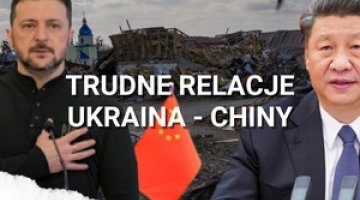The Geneva (dis)agreement on Ukraine
The ministers of foreign affairs of Russia, the United States and the European Union adopted a joint declaration on the Ukrainian crisis on 17 April in Geneva. This document lists the measures which need to be taken in order to bring about a de-escalation in the tension. However, it is extremely vague and leaves its parties a lot of room for manoeuvre in interpreting most of its provisions, including the key phrase “all parties” to the conflict. The stances adopted by the participants of this meeting differed significantly, and this was proven by the fact that separate press conferences were held, at the time of which the parties presented contradictory interpretations of the agreement.
The document signed in Geneva cannot be interpreted as a breakthrough in the Ukrainian crisis, nor does it prove that its signatories have reached a compromise on normalising the situation. The agreement will thus not have any real impact on the way the situation will continue to develop in eastern Ukraine. The upcoming presidential election (25 May), which Russia has been trying to torpedo, along with Kyiv’s unwillingness to accept Russian demands make it ever more likely that the tension in eastern Ukraine which Russia has stoked will grow and that Russia will make further attempts to expand the area of destabilisation to the southern part of the country.
The arrangements
It was agreed in the declaration adopted during the meeting that “all parties” shall refrain from using any forms of violence, intimidation or provocation; all illegal armed groups must be disarmed; all illegally occupied buildings, squares and streets in Ukrainian cities must be cleared; all “participants of protests” and those who voluntarily lay down arms will be covered by an amnesty; however, the amnesty will not apply to those who are found guilty of egregious crimes. The parties also agreed that the key role “in the coming days” in assisting the Ukrainian government and “local communities” in their immediate use of the measures to deescalate the conflict should be played by the OSCE Special Monitoring Mission. The USA, the EU and Russia undertook to support the OSCE mission, including by sending observers.
The document also contains a provision stating that the constitutional reform being prepared in Ukraine will be transparent, that it will take the interests of all regions into account, that it “will take into consideration” public opinion and the possibility that it may be amended. It was also agreed that Ukraine needs economic and financial stabilisation. Furthermore, the parties declared their readiness to discuss additional aid as the provisions of the adopted document are being implemented.
The Russian interpretation
Russia views the Geneva declaration as compatible with its strategy towards Ukraine. The document in Russia’s specific interpretation contains three key elements. Firstly, the obligation has been imposed on the government in Kyiv to refrain from using force against the armed separatists, and the West is obliged to refrain from influencing the Ukrainian government to this effect. Secondly, the Ukrainian government’s has obligations with regard to other signatories, including Russia, concerning the constitutional process and its results. Russia has thus provided itself with a formal pretext to interfere with the Ukrainian reform process by acting as a kind of a reviewer. Thirdly, this document presents the Russian interpretation of the crisis in Ukraine as a domestic Ukrainian conflict. The agreement does not impose any specific obligations on Russia.
The fact that the document does not mention the Ukrainian presidential election is convenient for Russia. This means that, should Moscow’s demands fail to be fulfilled, nothing has been done to restrict Russia’s possibilities to question the legitimacy of the election and its results. Meanwhile Moscow still wants to be given guarantees that constitutional changes will be carried out in Ukraine in compliance with its demands. The fact that Crimea was not mentioned in the declaration is an undoubted success for Russia. From Moscow’s point of view this means that the issue regarding Crimea’s status is closed and its revision is not among the conditions for ending the conflict. The document also failed to include the demand voiced by the Western and Ukrainian diplomacy that the Russian troops concentrated on the Russian-Ukrainian border must be withdrawn. Furthermore, Russia demonstrated a conciliatory stance during the Geneva meeting and thus made it more difficult for the West to impose real economic sanctions on it.
The Geneva agreement imposes on the Ukrainian government the obligation to take certain actions which coincide with Russian demands. Russia has used this as another element of the diplomatic and propaganda pressure being applied on Kyiv (as has been the case with the 21 February agreement so far). Unclear wording used in the document will allow Russia to accuse the Ukrainian government of breaching it and thus provide reasons and excuses for possible future moves towards Ukraine.
Russian comments following the adoption of the Geneva declaration clearly signify that Russia does not see itself as a party to this conflict and thus is not bound by the arrangements. Russia interprets the key phrase “all parties” as limited only to the actors on the Ukrainian political scene. It instead aspires to play the role of the guarantor of stabilisation in Ukraine and thus dictate its own terms. By interpreting the provisions of the declaration in a selective and unilateral manner, Moscow has used it for example to block all Kyiv’s solutions requiring the use of force with regard to the separatists, to offer political support to the separatists in eastern Ukraine and to influence the shape of the constitutional reform in Ukraine. Statements from Mr Lavrov and announcements by the Russian Ministry of Foreign Affairs include serious allegations that the government in Kyiv has breached the principles of the Geneva declaration and failed to implement the arrangements. This proves that Russia has used the adoption of this document as an instrument to put political pressure on Ukraine and also on the West.
Ukraine’s calculations
Ukraine took part in the Geneva meeting driven by different intentions than Russia. Firstly, Kyiv wanted to demonstrate that it was really interested in resolving the conflict and deescalating the situation in eastern Ukraine. Secondly, Ukraine hoped that the meeting would turn into a forum where it would be possible to condemn the actions of separatists who have drawn inspiration from Moscow. Thirdly, from Ukraine’s point of view, the fact that it has signed a joint document with Russia means that Moscow has in fact recognised the new Ukrainian government.
Ukraine views the agreement as a success since it does not impose any legal obligations on Kyiv, besides the discontinuation of solutions requiring the use of force against the separatists. The document envisages that a constitutional reform, including a decentralisation of the country, will be conducted, and this has already been declared by Kyiv. However, the agreement does not define the shape of the future reform (Russia has pressed for the federalisation of the country). The fact that representatives of the separatists were not invited to Geneva contrary to Russian demands was another success for Kyiv.
Ukraine has already made concrete steps to implement the Geneva agreement. On 18 April, the National Security and Defence Council of Ukraine passed a decision halting the anti-terrorist operation in Donetsk and Luhansk oblasts. However, the council’s decision has not been able to reduce the activity of pro-Russian militant groups to a significant extent. Incidents where firearms were used and attempts to occupy public administration buildings have still been seen in small towns. The same day, the Ukrainian government prepared a draft amnesty act covering the separatists and ordered work on the decentralisation reform be commenced.
Due to further moves from the separatists in Sloviansk, including the incident overnight between 19 and 20 April, where three people were killed and two pro-Ukrainian activists were murdered, the acting president Oleksandr Turchynov on 22 April appealed to the Verkhovna Rada (Ukrainian parliament) for the anti-terrorist operation to be resumed. The Ukrainian government believes that since the separatists have in fact disregarded the Geneva arrangements, Kyiv is not obliged to comply with them either in this case. The Ukrainian Ministry of Foreign Affairs has also accused Russia on several occasions of showing no readiness to fulfil the agreement and of continuing to support separatist militant groups in Ukraine.
Possible development of the situation after Geneva
The Geneva agreement does not mean that Kyiv is beginning to regain the initiative, nor will it have any real impact on the situation in eastern Ukraine. Russia and Ukraine have already accused one another of breaching the provisions of this document. Over the past few days, the United States has accused Moscow of ill will and of failing to fulfil the agreement on several occasions, and has threatened that more sanctions will be imposed. While US sanctions are likely, the Geneva arrangements have softened the stance of the key EU member states and have de facto prevented the EU from imposing further restrictions on Russia.
Given the present situation, the separatists in eastern and southern Ukraine are likely to make moves to provoke Kyiv to continue the using force. This would allow Moscow to accuse Kyiv of breaching the provisions of the Geneva declaration and to use this for propaganda purposes. It appears that as the presidential election date moves nearer, Moscow will be ever more determined to further escalate the situation in order to demonstrate that Kyiv has no control over part of the country, and thus that it is impossible to hold an election. The situation is likely to be especially tense on 9 May (the anniversary of the end of World War II) and on 11 May, the date the separatists have scheduled the referendum concerning the region’s status. In turn, the miners’ strikes which commenced on 22 April in Donbas may mean that Moscow will want to provoke anti-governmental demonstrations raising social issues in this region. If Russia’s attempts to activate the residents of eastern Ukraine fail, Russian sabotage activity is likely to intensify and Russia’s military engagement in Ukraine is likely to become stronger than it has been thus far.
Cooperation: Witold Rodkiewicz





